Are you experiencing abdominal pain, nausea, or jaundice? These could be signs of gallstones, a common condition affecting millions of people worldwide. In this article, we will explore the symptoms, causes, and surgical treatment options for gallstones, as well as provide a comprehensive overview of Gallstones diagnosis & treatment, helping you better understand this condition.
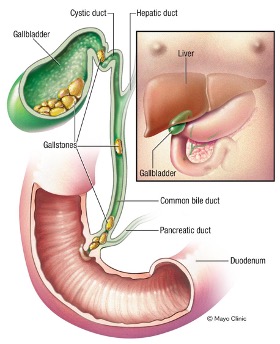
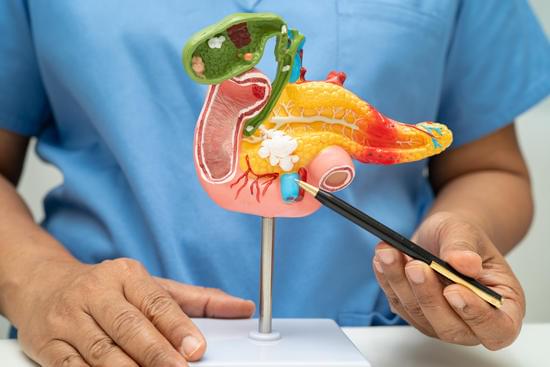
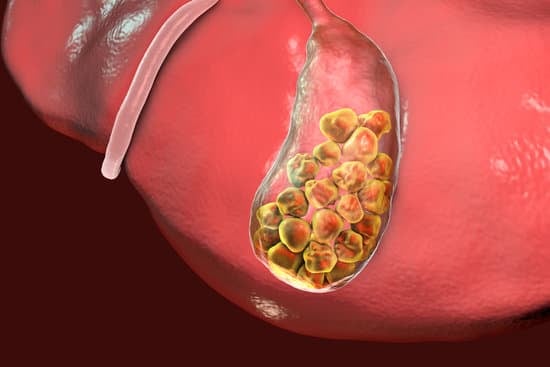
The symptoms of gallstones can be mild or severe, and they may include abdominal pain, indigestion, bloating, and jaundice. While certain risk factors, such as obesity, a high-fat diet, and a sedentary lifestyle, increase the chances of developing gallstones, they can also occur in individuals with no identifiable risk factors.
In some cases, gallstones may require surgical intervention to alleviate the symptoms and prevent complications. Gallstones diagnosis & treatment typically includes imaging tests such as ultrasound, and if surgery is necessary, the options include laparoscopic cholecystectomy and open cholecystectomy, both of which aim to remove the gallbladder and the stones within it. For the best outcomes, it’s recommended to consult the Best laparoscopic & bariatric surgeon in Dubai, who specializes in minimally invasive techniques for treating gallstones.
When looking for treatment options, seeking the Best laparoscopic & bariatric surgeon in Dubai ensures you receive expert care, especially for complex cases that may require advanced laparoscopic surgery. With their expertise, you can expect a quicker recovery time and reduced risk of complications.
By understanding the symptoms, causes, and surgical treatment options for gallstones, you can take proactive steps towards managing this condition and improving your overall well-being. So, let’s dive in and explore the world of gallstones together.
Gallstones are solid particles that develop in the gallbladder, a small organ located beneath the liver. They often cause a variety of symptoms, with abdominal pain being the most common. This pain, known as biliary colic, typically occurs in the upper right or central abdomen and may radiate to the back or right shoulder. It is often triggered by consuming fatty or greasy meals and can last from a few minutes to several hours. Other symptoms include nausea, vomiting, indigestion, and bloating, particularly after eating. These symptoms can interfere with daily life and often indicate a problem with the digestive system.
In more severe cases, gallstones may lead to additional complications. If a stone blocks the bile duct, it can result in jaundice, causing yellowing of the skin and eyes, dark-colored urine, and pale stools. Fever and chills may also occur if the blockage causes an infection, such as cholecystitis. While some individuals with gallstones remain asymptomatic for years, others may experience frequent and debilitating symptoms. Recognizing these signs early and seeking medical advice from the Best laparoscopic & bariatric surgeon in Dubai is essential to avoid complications and determine the appropriate Gallstones diagnosis & treatment, such as medication, lifestyle changes, or surgery.
Gallstones are solid particles that form in the gallbladder, a small organ beneath the liver that stores bile, a digestive fluid. One of the most common causes of gallstone formation is an imbalance in the substances that make up bile, including cholesterol, bile salts, and bilirubin. When bile contains too much cholesterol or not enough bile salts, it can crystallize into stones. Additionally, incomplete or infrequent emptying of the gallbladder can lead to bile becoming concentrated, further contributing to the formation of gallstones. This condition is more likely to occur in individuals with obesity, rapid weight loss, or diets high in fat and cholesterol.
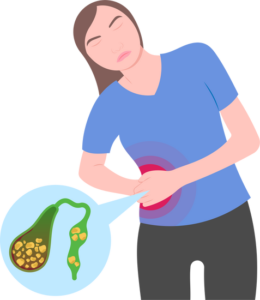
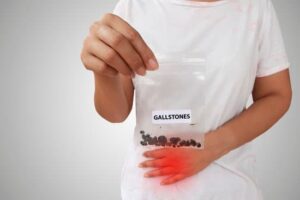
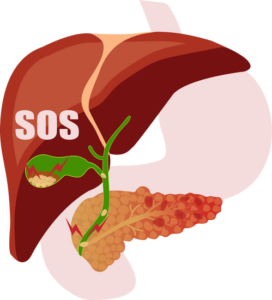
If you’re facing complications related to gallstones, it is advisable to consult with the Best laparoscopic & bariatric surgeon in Dubai, who can provide expert treatment options such as minimally invasive surgeries.
Hormonal factors can also play a significant role in the development of gallstones. Women are at a higher risk due to estrogen, which can increase cholesterol levels in bile. Pregnancy, hormone replacement therapy, and the use of birth control pills can further elevate this risk. Other contributing factors include genetics, a family history of gallstones increasing the likelihood of occurrence, and medical conditions such as diabetes or liver disease. Understanding these common causes is essential for identifying those at risk and taking preventive measures to reduce the likelihood of gallstone formation. Early detection through Gallstones diagnosis & treatment is critical to preventing complications and managing symptoms effectively.
Gallstones are hardened deposits that form in the gallbladder, and several risk factors contribute to their development. One of the most common risk factors is obesity, as excess body fat can increase the cholesterol in bile, which is a key component in gallstone formation. Additionally, age plays a significant role, with individuals over the age of 40 being more likely to develop gallstones. Women are also at a higher risk than men, particularly those who are pregnant, use birth control pills, or undergo hormone replacement therapy due to the hormonal changes that affect bile composition. A family history of gallstones can also increase the likelihood of developing them, as genetic factors can influence how the body processes cholesterol and bile.
Other factors that contribute to gallstone formation include a sedentary lifestyle, poor diet, and certain medical conditions. Diets high in fat, cholesterol, and refined carbohydrates can increase the risk, while fiber-rich diets may lower it. People with diabetes, liver disease, or conditions that affect the digestive system, such as Crohn’s disease, are also at a greater risk for developing gallstones. Rapid weight loss, which can occur through drastic dieting or weight-loss surgery, can also lead to the formation of gallstones as the body metabolizes fat at a faster rate, releasing excess cholesterol into the bile.
If you are considering treatment for obesity or gallstones, consulting the Best laparoscopic & bariatric surgeon in Dubai is highly recommended to explore effective options for surgery or weight-loss solutions. These risk factors highlight the importance of maintaining a healthy lifestyle to reduce the chances of gallstone formation. Early detection through proper Gallstones diagnosis & treatment is key to preventing complications and ensuring effective management of the condition
The diagnosis of gallstones typically begins with a review of the patient’s medical history and a physical examination to identify any common signs or symptoms, such as pain in the upper right abdomen, nausea, or jaundice. If gallstones are suspected, doctors usually recommend imaging tests to confirm their presence. The most common diagnostic tool for Gallstones diagnosis & treatment is an ultrasound, which provides a clear image of the gallbladder and can identify stones. This non-invasive procedure is highly effective in detecting gallstones and is often the first choice for diagnosis.
In some cases, additional tests may be necessary, particularly if the ultrasound is inconclusive or if complications are suspected. These tests can include a CT scan, which offers a more detailed view of the gallbladder and surrounding organs, or an MRI, which can be used to check for gallstones or any bile duct obstructions. In rare cases, a procedure called an endoscopic ultrasound (EUS) may be performed, where a small camera is inserted through the digestive tract to examine the gallbladder more closely. Blood tests may also be done to check for signs of infection or inflammation, further aiding in the Gallstones diagnosis & treatment planning.
For patients who may need surgical intervention for gallstones, it’s important to consult with the Best laparoscopic & bariatric surgeon in Dubai, who specializes in minimally invasive procedures to ensure optimal results and a faster recovery.
Non-surgical treatment options for gallstones are primarily aimed at managing symptoms and preventing complications, particularly in cases where surgery is not immediately necessary. One common approach is the use of medications, such as ursodeoxycholic acid, which can help dissolve cholesterol-based gallstones over time. However, this method is most effective for small stones and may take months or even years to work. In some cases, extracorporeal shock wave lithotripsy (ESWL) is used to break up larger stones into smaller fragments that can pass more easily through the bile ducts. While these methods can provide relief, they are typically considered when the gallstones are asymptomatic or when surgery is not an option due to other health concerns.
For individuals seeking Gallstones diagnosis & treatment, consulting with the Best laparoscopic & bariatric surgeon in Dubai can provide valuable insights into advanced treatment techniques, ensuring minimal invasion and faster recovery times.
Additionally, lifestyle changes are an important non-surgical approach to managing gallstones. A healthy diet low in fat and high in fiber, along with regular physical activity, can help prevent the formation of new stones and alleviate symptoms. In certain cases, physicians may recommend medication to control the pain associated with gallstones, especially during flare-ups. Although non-surgical treatments can help manage gallstones, they are often temporary solutions, and surgery remains the most definitive treatment for those who experience recurrent symptoms or complications such as inflammation or infection.
Surgical treatment for gallstones is often necessary when non-surgical methods, such as lifestyle changes or medications, fail to relieve symptoms or prevent complications. A proper Gallstones diagnosis & treatment plan is crucial in determining the most appropriate intervention. The most common surgical procedure for gallstones is a cholecystectomy, which involves the removal of the gallbladder. This surgery is typically performed using minimally invasive techniques, known as laparoscopic cholecystectomy, where small incisions are made in the abdomen, and a tiny camera and instruments are used to remove the gallbladder. This method has the advantage of shorter recovery times, less pain, and smaller scars compared to traditional open surgery.
For patients seeking the Best laparoscopic & bariatric surgeon in Dubai, it is important to choose a specialist with extensive experience in performing such procedures to ensure optimal outcomes.
In some cases, if a laparoscopic cholecystectomy is not feasible due to complications or other health conditions, an open cholecystectomy may be performed. This involves a larger incision to access and remove the gallbladder. In addition to these methods, some patients may require procedures such as endoscopic retrograde cholangiopancreatography (ERCP) to remove gallstones from the bile ducts if they have migrated out of the gallbladder. These surgical options aim to relieve the pain and potential health risks caused by gallstones, helping patients to return to their normal activities and avoid more serious complications like infections or pancreatitis.
Recovery and aftercare following gallstone surgery, typically involving gallbladder removal (cholecystectomy), are crucial for a smooth recovery process. After the surgery, patients are usually monitored in the hospital for a short period to manage pain and ensure there are no complications. Most people can go home within a day or two after laparoscopic surgery, which is less invasive and offers quicker recovery times compared to traditional surgery. It’s common to experience some discomfort, bloating, and fatigue in the initial days after surgery, but these symptoms typically subside with time. A key component of recovery is gradually resuming normal activities and following the prescribed pain management plan.
Post-surgery care also includes adhering to dietary guidelines and lifestyle changes. Initially, patients are advised to stick to a light, low-fat diet to ease digestion and prevent complications. Over time, the body adjusts to the absence of the gallbladder, but some individuals may experience digestive issues such as diarrhea or bloating. Regular follow-up appointments with the healthcare provider are essential to monitor progress and address any concerns. Staying hydrated, avoiding strenuous activities, and taking medications as prescribed are important to ensure optimal healing. With proper care and attention to lifestyle changes, most individuals make a full recovery within a few weeks.
For those undergoing Gallstones diagnosis & treatment, understanding the recovery process is critical to managing expectations and ensuring the best outcome post-surgery. Proper aftercare is essential for long-term health and well-being after gallstone removal. If you’re looking for expert guidance and care, consulting the Best laparoscopic & bariatric surgeon in Dubai can provide the expertise and support necessary for a smooth recovery.
Gallstone surgery, typically a cholecystectomy (removal of the gallbladder), is a common and generally safe procedure. However, like any surgery, it comes with potential risks and complications. One of the most common complications is infection at the incision site, which may require antibiotics or further treatment. Other risks include bleeding, injury to nearby organs like the bile ducts, and blood clots. In rare cases, a patient may develop bile leakage, which can lead to serious issues such as infection or peritonitis if not treated promptly. Additionally, some patients may experience adverse reactions to anesthesia.
Another potential risk involves digestive changes post-surgery. Although the gallbladder is not essential for life, its removal can sometimes lead to bile-related digestive problems. These may include diarrhea or difficulty digesting fatty foods due to the lack of bile storage. Some patients may also develop post-cholecystectomy syndrome, where they continue to experience symptoms similar to those caused by gallstones, such as abdominal pain or bloating. While most of these issues resolve over time, some may require dietary adjustments or medications for long-term management.
For a comprehensive understanding of gallstones and to ensure effective care, it’s important to consult with experts in Gallstones diagnosis & treatment, such as the Best laparoscopic & bariatric surgeon in Dubai, to minimize risks and identify the most suitable treatment options for your specific condition.
Conclusion: Living with Gallstones
Living with gallstones can be challenging, especially for those who experience frequent or severe symptoms. For individuals diagnosed with gallstones but not yet requiring surgery, managing the condition often involves lifestyle modifications, such as adopting a healthier diet low in fats and cholesterol, maintaining a healthy weight, and staying active. Regular monitoring by a healthcare provider is important to ensure the condition does not worsen. If symptoms like pain, nausea, or jaundice occur, medical intervention may be necessary. Timely Gallstones diagnosis & treatment can help avoid complications such as gallbladder inflammation or infection.
If surgery becomes necessary, consulting with the Best laparoscopic & bariatric surgeon in Dubai can offer advanced treatment options and minimize recovery time, ensuring the best outcomes for patients.
Preventing Gallstones
Prevention is key to reducing the risk of developing gallstones. While genetics play a role, there are several lifestyle changes that can help lower the likelihood of their formation. Eating a balanced diet rich in fiber and healthy fats, maintaining a healthy weight, and avoiding rapid weight loss are effective preventive measures. Additionally, regular exercise and staying hydrated can also support gallbladder health. By taking these steps and seeking early gallstones diagnosis & treatment, individuals can reduce their chances of developing gallstones and promote long-term digestive health.
Schedule your appointment quickly and easily with just a few clicks.




Dr Ahmed Hassn is a UK trained highly qualified Best Laparoscopic & Bariatric Surgeon with more than 21 years of consultant experience in his field.
Don’t miss our future updates! Get Subscribed Today!
©2024. Dr Ahmed Hassn. All Rights Reserved.